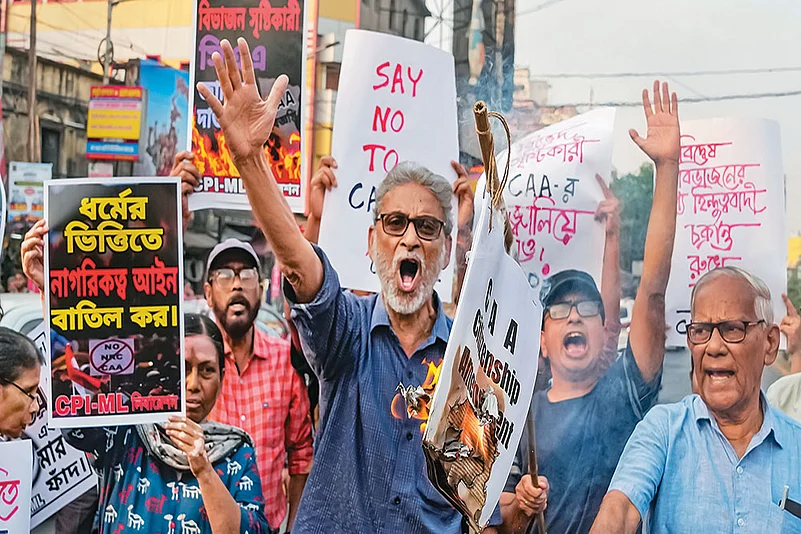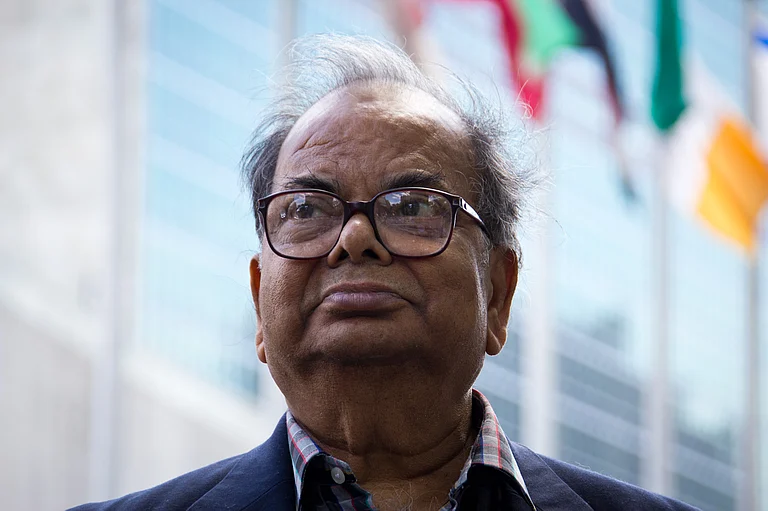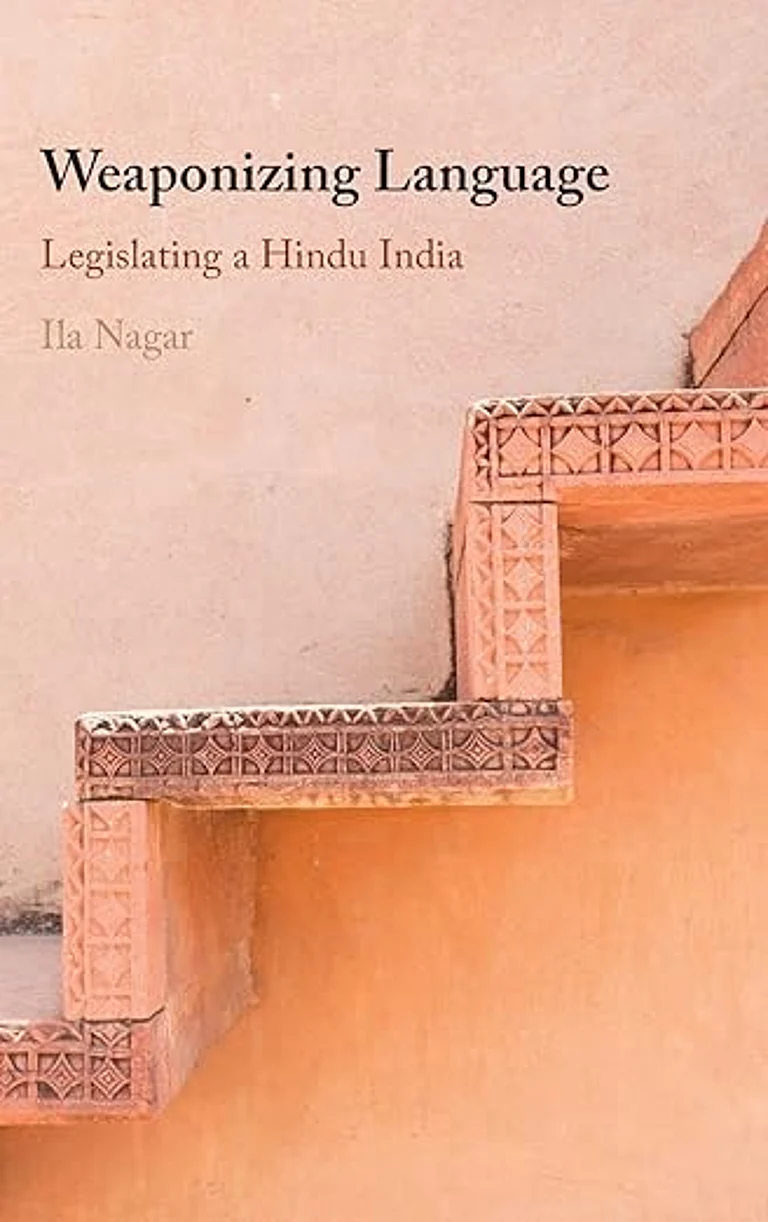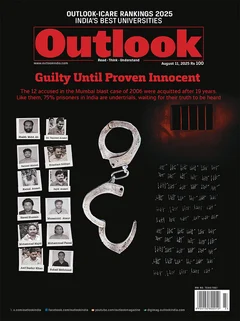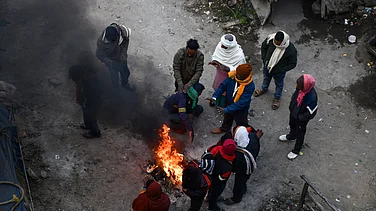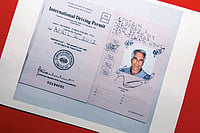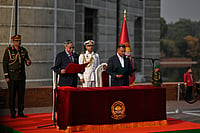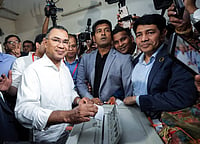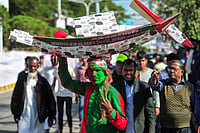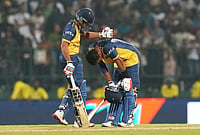A rush Adhikary’s detention in Maharashtra’s Pune, along with his wife, sister, brother-in-law, a friend and three minors, must have come as a facepalm moment for Shantanu Thakur, the junior minister for shipping in Prime Minister Narendra Modi’s cabinet.
They are all from West Bengal’s North 24 Parganas district, the district Thakur comes from. One of the detainees, Bibek Goswami, is a voter of Bangaon parliamentary constituency that Thakur has represented since 2019.
When they were detained over July 2 and 3 as suspected Bangladeshi nationals, they not only submitted their Voter ID, Aadhaar and PAN as proof of nationality but also identity cards issued by the minister-led faction of All India Matua Mahasangha (AIMM), the presently-split apex body of the Matua religious sect.
The AIMM membership cards were signed by Thakur himself. But the police in the Bharatiya Janata Party (BJP)-governed Maharashtra did not recognise any of these documents as proof of their Indian nationality.
For over a year, Thakur has been claiming that Hindus need not worry about papers during any citizenship screening drive, as the Citizenship Amendment Act (CAA) 2019 ensures citizenship to every Hindu of Bangladesh origin who entered India on or before December 31, 2014. The CAA offers citizenship to non-Muslim migrants from India’s Muslim-majority neighbours—Pakistan, Afghanistan and Bangladesh.
In March 2024, when the Union government started implementing the CAA by notifying the Citizenship Amendment Rules, despair spread among a section of Hindu migrants from Bangladesh, including Thakur’s own community.
The Matuas mostly have their roots in Bangladesh and many of them have got their Indian identity documents through various illegal means. They have been the key advocates of the CAA, hoping for a permanent solution to their questionable citizenship.
However, the March 2024 notification revealed that applicants are required to furnish proof of their former residence in Bangladesh—passport, birth or school certificate or land records of self or parents—papers that most migrants from Bangladesh do not have.
To assuage the disappointment, Thakur told the migrant Hindus in a boastful and reassuring manner that the lack of papers would not be an issue for Hindus and membership cards issued by the AIMM would be sufficient as supporting documents. He urged the Matuas to apply for citizenship without worrying about the lack of documents and get membership of his faction of the AIMM to strengthen their claim.
Among many hundreds, Adhikary’s family, too, had queued up at Thakur’s residence-cum-AIMM office at Thakurnagar, Bangaon, to get the membership cards. But it could not save them from harassment.
Adhikary’s family members say that the detainees had been released from custody after two to three days, following interventions by their family and some civil society organisations, but were kept under ‘house arrest’, without access to their phones, until the police were satisfied, in the last week of July, that they were Indians.
Soon emerged another video, in which Nishikanta Biswas, a voter of Ranaghat parliamentary constituency in Nadia district, narrated how his sons, Manishankar and Nayan, are languishing in jail for the past six months since the Maharashtra police arrested them as Bangladeshi nationals. Biswas, too, said that his family, apart from government-issued documents, also possesses identity cards issued by the Shantanu Thakur-led faction of the AIMM.
West Bengal’s ruling party, chief minister Mamata Banerjee’s Trinamool Congress (TMC), made full use of the incidents to highlight the hollowness of Thakur’s promises. “We always knew and warned people that this card was a scam,” says Mukutmani Adhikary, TMC MLA from Bangaon Dakshin assembly, himself a Matua. “We said the CAA was a bluff-cum-trap. Now, everyone will see.”
Irking Allies
As of June, the hunt for undocumented Bangladeshi migrants was mainly targeting Bengali-speaking Muslims in BJP-ruled states. However, the recent harassment of some Hindus has put the Bengal BJP on a sticky wicket.
The Matuas are one of Bengal’s politically important groups. Most of the sect’s followers come from the Dalit (Scheduled Caste) Namasudra community. The Namasudras, currently Bengal’s second-largest SC group after the Rajbanghis of northern Bengal, were one of the dominant social groups in eastern Bengal but migrated to West Bengal in their thousands since the Partition.
They play the key role in determining the fate of at least two parliamentary constituencies—Bangaon and Ranaghat—and over a dozen assembly seats. While Shantanu Thakur leads the pro-BJP faction of the AIMM, Mamata Thakur, his aunt and a TMC Rajya Sabha member, helms the other AIMM faction.
In June 2025, when the random and indiscriminate detention of Bengali-speaking Muslims in the BJP-ruled states of Gujarat, Rajasthan, Maharashtra and Odisha as suspected Bangladeshis was growing bigger as a political controversy, Thakur assured the Hindus that they were safe.
On June 1, he posted on social media clippings from Union Home Minister Amit Shah’s speech, in which Shah said that anyone (Hindu) receiving notice for proving nationality should immediately apply for citizenship under the CAA and his ministry would get the rest done. Sharing Shah’s speech, Thakur urged everyone to apply for citizenship under the CAA.
But Hindus, especially those with roots in eastern Bengal, are not assured. Subodh Biswas, National President, Nikhil Bharat Bangali Samanway Samittee (All India Bengali Coordination Committee), an organisation that predominantly works among Bengali Hindus of Bangladesh origin, says that the problem no longer concerns only Bengali Muslims or Bengali Hindus of Bangladesh origin but affects every Bengali.
Fear has spread much beyond those who come under the CAA’s ambit. Reports of Bengali Hindus facing harassment in BJP-ruled states keep pouring in.
“If an entire ethnic group is branded as outsiders, migrants and terrorists, it’s an ethnic vilification that’s going to have far-reaching social consequences,” says Biswas, who lives in the western Indian state of Maharashtra. “Bengali identity is facing a national crisis.”
Biswas said that panic has widely spread among Bengalis living in Maharashtra, Odisha, Chhattisgarh, Uttarakhand and Haryana, among other states. He adds that the CAA has not been able to satisfy the Hindu migrants, as the clause seeking documentary evidence of past roots in Bangladesh discourages people from applying.
“Though the government has not given any official figure for the number of applications received and citizenship granted, we don’t think even 1,000 people from Bengal have been granted citizenship,” he says, adding, “Whereas, people who require flawless citizenship number in lakhs.”
Members of a Matua family from Chandpara in Bangaon say that they fear applying without documentation would leave them at the mercy of government officials, which could lead to situations worse than their present conditions.
“At present, the main problem is that whenever Matua-Namasudras apply for passports, the police seek records showing family members’ names on the voter list or land records predating 1971,” says a member of a family of seven. “But declaring oneself as a Bangladeshi without having the papers to secure citizenship is a highly risky step.”
According to researcher Ayan Guha, a British Academy International Fellow at the School of Global Studies, University of Sussex, UK, among the migrants from Bangladesh, arguably the potential beneficiaries of the CAA, the apprehensions about citizenship screening stem from the inability of most of them to derive promised benefits out of the Act.
“Most of them don’t have documents issued by the Bangladesh government, which has prevented them from applying and receiving citizenship certificates. The rules under the CAA have not been changed so far to exempt them from the requirement of producing Bangladeshi documents,” Guha says. He adds that in the absence of citizenship certificates, they fear that they might be excluded from the citizenship list if a screening exercise is ever carried out.
Besides, the electoral roll revision, which is being carried out in Bihar, “does not immunise Hindus from omnipresent and deeply intrusive documentary gaze of the state,” he says. The inadmissibility of documents like Aadhaar card and ration card make it difficult for the less affluent, Hindus and Muslims alike, to prove their legitimacy as voters and citizens.
“For the less privileged, it is a question of survival and disenfranchisement, while for others it is an unpleasant experience of unwanted contact with an excessively probing bureaucracy,” Guha says.
Preventing Panic
Mohitosh Baidya, a senior functionary of the Shantanu Thakur-led faction of the AIMM, agrees that panic has spread among the Matuas. He, however, blames “a mala fide, misinformation campaign” launched by “people with vested interests” for the panic.
“It’s true, some people are concerned about applying without adequate documents in their possession. We have been telling the Union government that this condition should be relaxed. But, without waiting for such relaxation, refugees should start applying. Once a person has applied, they cannot be deported,” Baidya argues.
Even if some are detained, they would be released the moment the police see they have applied for citizenship, he says.
Asked why cards issued by AIMM could not save the Matuas in Maharashtra from jail and detention, Baidya said that none of these families approached them over the matter. He hopes the Union government would instruct different states not to detain Hindus, as they are not supposed to be deported in any case.
Meanwhile, fear has spread much beyond those who come under the CAA’s ambit. Reports of Bengali Hindus facing harassment in BJP-ruled states keep pouring in. Murshidabad district resident Sujan Sarkar was thrashed in Odisha. South 24-Parganas district resident Subrata Jana was detained in Chhattisgarh. Debashis Das of Hooghly district returned traumatised after facing detention in Odisha.
Panic has also spread among the Koch-Rajbanshis, another group that has overwhelmingly supported the BJP in the Assam-bordering Cooch Behar-Jalpaiguri belt of northern West Bengal, even though the TMC managed to win back some of them of late. The Koch-Rajbanshis live in both Assam and West Bengal.
Among Rajbashis, Cooch Behar’s Mathabhanga resident Uttam Kumar Brajabasi has received a notice from a Foreigners’ Tribunal in Assam, asking him to prove he is not a Bangladeshi. Cooch Behar’s Tufanganj native Arati Ghosh, who had shifted to Assam following her marriage, got branded as a Bangladeshi.
Bengal BJP leaders expect the detention of Hindus in other BJP-ruled states to soon stop. They believe the party’s national leadership and the Union government are already coordinating with different states to ensure one is let off as soon as the police realise the person is a Hindu.
“Protecting Hindu migrants from Bangladesh is our core agenda. Some problems are popping up while screening the nationality of Muslims but the party and the government will surely figure out some mechanism,” says a BJP Lok Sabha MP from Bengal.
Pushing Hindus into a state of panic could be electorally disastrous, he knows. The elections are less than a year away.
MORE FROM THIS ISSUE
Snigdhendu Bhattacharya is a journalist, author and researcher.
Outlook Magazine’s next issue, “Guilty Until Proven Innocent”, looks at the 19 years lost of those who were in jail and those who thought justice was served, until it wasn’t. This article appears as 'Suspected Citizens' in the magazine.






